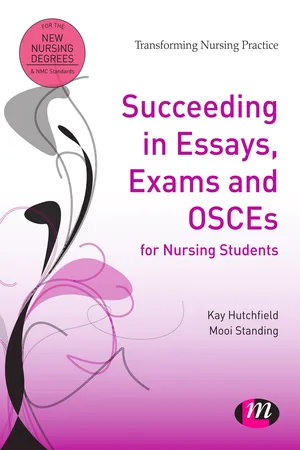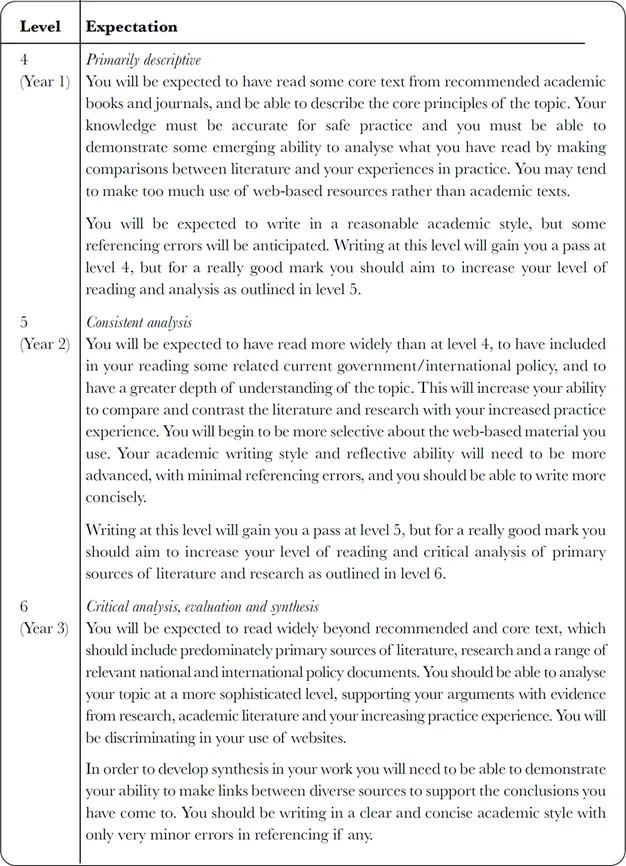
This is a test
- 120 pages
- English
- ePUB (mobile friendly)
- Available on iOS & Android
eBook - ePub
Succeeding in Essays, Exams and OSCEs for Nursing Students
Book details
Book preview
Table of contents
Citations
About This Book
The word ?assessment? can strike terror into any student. However, providing evidence of knowledge and skills for professional practice is an integral and essential part of university life as a nursing student.
This book helps nursing students better understand the processes of assessment so that every student can achieve their potential in their studies. It looks at each of the major forms of assessment including essays, exams, portfolios, presentations, OSCEs and practice assessments. It specifically addresses the needs of nursing students on new degree courses and therefore gives a clear insight on how to succeed as a student nurse.
Frequently asked questions
At the moment all of our mobile-responsive ePub books are available to download via the app. Most of our PDFs are also available to download and we're working on making the final remaining ones downloadable now. Learn more here.
Both plans give you full access to the library and all of Perlego’s features. The only differences are the price and subscription period: With the annual plan you’ll save around 30% compared to 12 months on the monthly plan.
We are an online textbook subscription service, where you can get access to an entire online library for less than the price of a single book per month. With over 1 million books across 1000+ topics, we’ve got you covered! Learn more here.
Look out for the read-aloud symbol on your next book to see if you can listen to it. The read-aloud tool reads text aloud for you, highlighting the text as it is being read. You can pause it, speed it up and slow it down. Learn more here.
Yes, you can access Succeeding in Essays, Exams and OSCEs for Nursing Students by Kay Hutchfield,Mooi Standing in PDF and/or ePUB format, as well as other popular books in Medicine & Nursing. We have over one million books available in our catalogue for you to explore.
Information
Chapter 1 An Introduction to Assessment in Pre-registration Nursing Programmes
NMC Standards for Pre-registration Nursing Education
This chapter will address the following competencies:
Domain 2: Communication and Interpersonal Skills
- 8. All nurses must respect individual rights to confidentiality and keep information secure and confidential in accordance with the law and relevant ethical and regulatory frameworks, taking account of local protocols. They must also actively share personal information with others when the interests of safety and protection override the need for confidentiality.
Domain 3: Nursing Practice and Decision-making
- 1. All nurses must use up-to-date knowledge and evidence to assess, plan, deliver and evaluate care, communicate findings, influence change and promote health and best practice. They must make person-centred, evidence-based judgements and decisions, in partnership with others involved in the care process, to ensure high quality care. They must be able to recognise when the complexity of clinical decisions requires specialist knowledge and expertise, and consult or refer accordingly.
- 2. All nurses must possess a broad knowledge of the structure and functions of the human body, and other relevant knowledge from the life, behavioural and social sciences as applied to health, ill health, disability, ageing and death. They must have an in-depth knowledge of common physical and mental health problems and treatments in their own field of practice, including co-morbidity and physiological and psychological vulnerability.
Domain 4: Leadership, Management and Team Working
- 4. All nurses must be self-aware and recognise how their own values, principles and assumptions may affect their practice. They must maintain their own personal and professional development, learning from experience, through supervision, feedback, reflection and evaluation.
Chapter Aims
By the end of this chapter you should be able to:
- understand the purpose and process of the assessments on your nursing programme;
- understand the link between learning outcomes and your assessments;
- discuss the value of formative assessments;
- understand the role feedback plays in helping you improve your performance in assessment.
Introduction
Case Study: Jenny
Jenny is a first-year nursing student and has been really enjoying her first year at university. She has made lots of new friends and joined several student union groups; she has a busy social life. She has attended university for her lectures and seminars but has found it difficult to fit independent study in around her university social life. She has not worried too much about her first assignments as she always managed to pass exams at school with some last-minute revision.
Six months into her programme Jenny goes to see her personal tutor as she has failed one of her first assignments and failed some competencies of her formative practice assessment. It is only at this point that she realises that if she does not pass her resubmitted course work, she will have to leave the programme. She also realises that if she fails her summative practice assessment she will have to repeat her practice assessment, which will result in her having to step off her programme for six months and rejoin with another student group. Jenny is distraught; she realises how important becoming a nurse is to her and that she will have to create a better balance between her studies and her social life if she is going to achieve her ambition. Jenny and her personal tutor develop an action plan that includes creating a study timetable, regular meetings with her personal tutor and support from the study resource centre in order to ensure that her resubmitted work is of an acceptable standard.
In 2010 the NMC published a Strategic context report (NMC, 2010a) that states:
Recent figures suggest attrition rates of around 28 per cent on pre-registration nursing courses. (NMC, 2010a, para 36, p5)
This data suggests that over a quarter of nursing students fail to complete their nursing programme. There is a range of reasons for this high drop-out rate, but a proportion of those leaving will have done so because they have failed to pass all the assessment tasks they have been set. Jenny could have been one of those statistics as it is easy to put studying to one side when you start university as there are so many social activities happening that are fun and interesting.
Success in any nursing programme is dependent on the student passing a range of academic and practice assessments. Although normally students have at least one resit opportunity, having to repeat a practical assessment, resubmit a written assignment or resit an examination involves the student in additional work and stress on top of their normal study load.
This chapter is designed to enable you to understand how to prepare for your assessments and effectively address any assessment task. It will begin with some consideration of the meaning of assessment before discussing the concept of fitness for practice and award. A range of assessment methods will be explored to enable you to understand how you can best demonstrate your achievement of the standard required in practice and in your academic work. The chapter will explore the expectations of different levels of academic work and discuss how learning outcomes are linked to your academic and practice assessments in order to enable you to understand how to use this information to enhance your performance in assessments.
The Purpose and Process of Assessment in Pre-registration Nursing Programmes
To ensure that pre-registration nursing programmes produce nurses that are of quality and fit for purpose, the Nursing and Midwifery Council and the Quality Assurance Agency for Higher Education (QAA) have produced standards for assessment that need to be met to ensure that nursing students are fit for practice (NMC, 2010b) and award (QAA, 2006).
Your nursing programme will have been designed to meet the new standards for pre-registration nursing education (NMC, 2010b). This document also outlines the generic and pathway-specific competencies needed to meet the NMC requirements for registration as a nurse. Your university will have developed a programme based on these standards and will have been scrutinised by the NMC and the university's quality assurance processes to ensure that when you have successfully completed the programme you are fit for practice and award.
The assessment of practice will be explored in depth in Chapters 3 and 6. The next section will focus on explaining the concept of fitness for award.
Fitness for Award
Your pre-registration nursing programme will have an exit award at a minimum of degree level. In higher education terms this is described as level 6 and is first-degree level. The Quality Assurance Agency has produced descriptors (QAA, 2008a) that outline the standard of academic work required for each level of a degree programme. If you are interested in learning more about these descriptors, go to the QAA framework for higher education qualifications (QAA, 2008a) available at www.qaa.ac.uk/Publications/InformationAndGuidance/Pages/The-framework-for-higher-education-qualifications-in-England-Wales-and-Northern-Ireland.aspx.
The assessments you undertake each year are designed to measure whether you have developed sufficiently to meet these academic criteria and progress to the next year. Your university will have developed assessment criteria that reflect those outlined by the QAA (2008a). When your work is assessed the marker will use these assessment criteria to award a mark depending on how well your work meets the criteria.
The QAA descriptors are designed for tutors rather than students, so you may find it easier to think about each year of your programme in the way outlined in the box.

Each year of your programme will contain a number of course units or modules, the learning outcomes of which will be measured by an assessment.
In all new nursing programmes there are two progression points that occur around the end of years 1 and 2. At each progression point you will be required to have completed all your assessments of theory practice and practice hours for the year.
Activity 1.1 Critical Thinking
Access your programme handbook and identify where the progression points fall. Read the section on assessment so that you are clear about your university's rules and regulations surrounding assessment and resubmissions.
As this answer is based on your own observation, there is no outline answer at the end of the chapter.
Your nursing programmes will have broad programme aims, and each module, unit or course within the three-year programme will have learning outcomes designed to support the achievement of the overall aims of the programme. These learning outcomes will also have been mapped against the standards (NMC, 2010b) and the QAA subject benchmark statements for nursing (QAA, 2008b) to ensure that your programme is fit for purpose. The learning outcomes for each course, unit or module must be clearly linked to the assessment task and practice experience to support the application of theory to practice.
Activity 1.2 Critical Thinking
Access your course/module handbook or the guide for the unit that you are currently undertaking. Find the learning outcomes for this course, module or unit and consider each of the following.
- How is each learning outcome measured in the assessment?
- Where can you find the marking criteria that the marker w...
Table of contents
- Cover
- Half Title
- Publisher Note
- Title Page
- Copyright Page
- Contents
- Foreword
- About the Authors
- Acknowledgements
- Introduction
- Chapter 1 An Introduction to Assessment in Pre-registration Nursing Programmes
- Chapter 2 Succeeding in Written Assignments
- Chapter 3 Succeeding in Practice Assessments
- Chapter 4 Succeeding in Written Examinations
- Chapter 5 Succeeding in Portfolios
- Chapter 6 Succeeding in Objective Structured Clinical Examinations (OSCEs)
- Chapter 7 Succeeding in Presentations
- Chapter 8 Where to Look for Support with your Assessments
- References
- Index